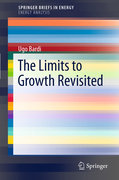
“The Limits to Growth” (Meadows, 1972) generated unprecedented controversy with its predictions of the eventual collapse of the world's economies. First hailed as a great advance in science, The Limits to Growth was subsequently rejected and demonized. However, with many national economies now at risk and global peak oil apparently a reality, the methods, scenarios, and predictions of The Limits to Growth are in great need of reappraisal. In Limits to Growth Revisited , Ugo Bardi examines the science and politics surrounding this work, andin particular the reactions of economists that marginalized its methods and conclusions for more than 30 years. Although there have been several reappraisals in the recent literature, this book is the first complete study covering both the science and the polemics. The Limits to Growth was a milestone in attempts to model the future of our society, and it is vital today for both scientists and policy makers to understand its scientific basis, current relevance, and the social and political mechanisms that led to its rejection. Bardi alsoaddresses the all-important question of whether the methods and approaches ofThe Limits to Growth can contribute to an understanding of what happened to the global economy in the Great Recession and where we are headed from here. Shows how “Limits to Growth,“ is a subject more relevant today than when the book was first published. Demonstrates how scenario building based on system dynamics models or other methods is an essential tool in understanding possible futures. Examines the factors that may lead to the rejection of good science when the conclusions are unpleasant. Separates the reality that the future can never be predicted with certainty from the need to prepare for it
- ISBN: 978-1-4419-9415-8
- Editorial: Springer New York
- Encuadernacion: Rústica
- Páginas: 120
- Fecha Publicación: 12/06/2011
- Nº Volúmenes: 1
- Idioma: Inglés
